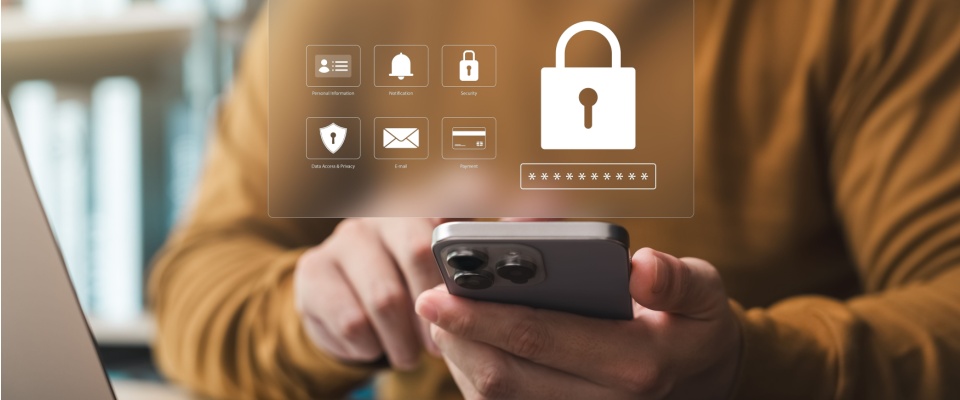October marks Cybersecurity Awareness Month, a reminder that protecting yourself online matters just as much as locking your front door or securing your belongings with renters insurance.
For many renters, almost every part of daily life, from paying rent online to shopping for groceries, happens over the internet. While digital tools make life easier, they also open the door to risks like identity theft, phishing scams, or hacked accounts.
This guide offers practical tips to learn how to stay safe online by recognizing threats, securing your accounts, and being mindful of your personal data.
What is cybersecurity?
Cybersecurity is the practice of protecting your devices, accounts, and personal information from digital threats. These threats include:
- Hackers trying to steal your passwords
- Malware infecting your laptop
- Phishing emails tricking you into giving away sensitive information
Just as you wouldn’t leave your apartment door wide open, you don’t want to leave your digital “doors” unprotected. That means using strong passwords, keeping your software updated, or learning to spot suspicious online activity.
Why cybersecurity matters to renters
Cybersecurity might sound like a technical concept, but its impact hits close to home. As a renter, you rely on digital platforms for apartment applications, lease agreements, bill payments, and renters insurance management. Your Social Security number, bank account details, and personal data are stored across multiple online platforms, making them attractive targets for cybercriminals.

Without protection, one weak password or a single click on a malicious link could expose your sensitive information. This might lead to identity theft, financial loss, or compromised accounts.
How to stay safe online
Build strong and unique passwords
One of the most effective ways to stay safe online is by creating strong, unique passwords. Using “123456” or reusing the same password across multiple sites makes it easier for hackers to break into your accounts.
Here are some of the best practices for coming up with strong passwords:
- Create passwords that are at least 12 characters long.
- Mix uppercase and lowercase letters, numbers, and symbols.
- Avoid using personal information like birthdays or pet names.
- Use a password manager to store different passwords and generate strong ones automatically.
Enable multi-factor authentication (MFA)
Multi-factor authentication, or MFA, adds another layer of security to your accounts. Even if someone steals your password, they’ll need a second form of verification, like a text code or an authentication app, to log in.
An MFA is like adding a deadbolt to your digital front door. It may feel like an extra step, but it often makes the difference between a secure account and a compromised one.
Start by enabling MFA on your most important accounts: banking, email, and social media. Then expand it to other services like your apartment portal or streaming accounts.
Recognize and avoid phishing scams
Phishing threats usually arrive by email or text, pretending to be from legitimate sources like your landlord, bank, or a streaming service. These messages pressure you to click a link or share personal information immediately.

How to spot phishing attempts:
- Look for spelling errors or strange formatting.
- Check the sender’s email address closely.
- Be suspicious of urgent language like “Act now!” or “Your account will be closed.”
- Hover over links to see where they lead before clicking.
When in doubt, don’t click. Instead, go directly to the official website or call customer service using the number listed on the company’s site.
Keep your devices updated
Updates aren’t just about new features; they often include security patches that prevent hackers from exploiting outdated systems. That’s why updating your phone, laptop, and apps is essential for staying safe online.
Turn on automatic updates where possible, so you don’t have to remember to do it yourself.
Secure your Wi-Fi network
Your home Wi-Fi is the gateway to all your online activity, so you’ll want it to be secure.
Make sure you:
- Change the default router password to something strong.
- Use WPA3 or WPA2 encryption (check your router settings).
- Hide your network name if you want to add an extra layer of privacy.
Another way to stay safe online is to avoid doing sensitive tasks, like online banking, when connected to public Wi-Fi. If you need to use one, use a virtual private network (VPN) to encrypt your data.
Back up your data
Even with the best protection, ransomware attacks, stolen devices, or accidentally deleting files can still happen. Back up your data to ensure you won’t lose important files, photos, or documents.
Use cloud storage, an external hard drive, or both. Having a backup plan makes recovery much easier if your primary device is compromised.
Be mindful of social media
Posting on social media can reveal more than you think. A photo showing your apartment building or nearby landmarks can help strangers figure out where you live. Even sharing vacation photos while you’re away lets others know your apartment is empty.

Oversharing can also put your digital security at risk, with details like your pet’s name potentially helping someone guess your passwords or security questions.
Keep such details private and be selective with what you post to stay safer online and protect your apartment in real life too.
A safer digital life starts with awareness
Cybersecurity may sound complex, but at its core, it’s about learning how to stay safe online with habits that anyone can follow. By creating strong passwords, turning on multi-factor authentication, staying alert to scams, and keeping your devices updated, you’re already ahead of most online threats.
For renters, digital safety protects more than just your Wi-Fi password; it protects your finances, your identity, and your sense of security. Use Cybersecurity Awareness Month as an opportunity to review your current practices, update your security settings, and build habits that will keep you secure all year long.
